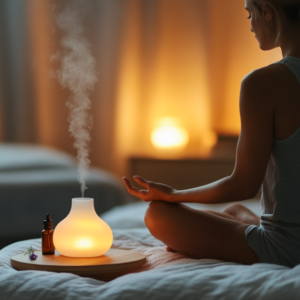Stress and Sleep Tips That Actually Work
If stress is keeping you up at night, you’re not alone. These stress and sleep tips will help you calm your mind, ease anxiety, and enjoy deep, restorative rest—starting tonight.
Key Takeaways on Stress and Sleep Tips
- Start your evening with calming rituals like deep breathing and journaling.
- Manage blue light exposure at night to signal your body it’s time for rest.
- Incorporate scents like lavender or chamomile for natural relaxation.
- Practice muscle relaxation techniques to release tension before bed.
- Adopt healthy daytime habits like morning sunlight and regular exercise.
Do you ever lie in bed at night with your mind spinning, completely unable to unwind? You’re not alone. That’s why more and more people are searching for stress and sleep tips that actually work. When stress and anxiety sneak into your bedtime routine, they can make it nearly impossible to fall or stay asleep. And instead of waking up refreshed, you feel even more frazzled.
But here’s the comforting news: with the right stress and sleep tips, you can calm your mind, ease anxiety, and finally get the rest you need. In this guide, we’re unpacking why stress messes with sleep—and how to gently invite relaxation back into your evenings.
(Need more help? Don’t miss our full guide on Reducing Stress for Better Sleep.)
Why Stress Keeps You Up at Night
Stress activates your body’s fight-or-flight response, releasing hormones like cortisol and adrenaline that keep your brain alert when you want to wind down.
- 🌀 You lie awake thinking about everything.
- 😵💫 You keep waking up through the night.
- 🛏️ Your sleep stays shallow instead of deep and restful.
- ☕ You need caffeine to get through the day.
Read this if you’re tired of waking up at 3 a.m. And according to Cedars-Sinai, stress-related insomnia can hurt your mood, memory, and even your immune system.
Signs Stress Is Disrupting Your Sleep
If you notice any of these patterns, stress may be interfering with your rest:
- Your mind won’t stop racing at night.
- You wake up multiple times or too early.
- Your muscles feel tense, even in bed.
- You sleep for hours but wake up tired.
- You feel groggy without your morning coffee.
These are exactly the kinds of issues stress and sleep tips are designed to solve. And if you’re tempted to hit snooze, check out Why You Shouldn’t Hit Snooze.
Real-Life Stress and Sleep Tips That Actually Work
Simple nightly habits can significantly improve your sleep quality. Here are our favorites:
🧘♀️ Breathe Deeply Before Bed
One of the simplest yet most powerful stress and sleep tips is deep breathing. The 4–7–8 technique is especially calming:
Inhale for 4 seconds, hold for 7, exhale for 8. Repeat 4–5 times.
💆♀️ Relax With Progressive Muscle Tension
Release stress by tensing and relaxing muscle groups from your toes up to your face.
Start with your toes. Tense, hold for 5 seconds, then release.
📓 Write It All Out
Journaling lets you mentally wrap up your day, making space for rest:
- List worries, then set them aside.
- Note tomorrow’s tasks.
- End with something positive or grateful.
🌿 Let Scents Soothe You
Scents like lavender and chamomile are known for reducing stress and promoting calm.
🔵 Dim the Blue Light
Reduce light exposure to help your body prepare for sleep:
- Dim lamps after dinner
- Avoid screens 30–60 minutes before bed
- Use blue-light glasses or app filters
📖 Drift Off With a Story
Guided meditations and bedtime stories can help redirect your focus and lower cortisol levels.
Your Ideal Evening Routine for Less Stress
A consistent bedtime ritual tells your body it’s time to relax:
9:00 PM – Dim lights, put phone away
9:15 PM – Warm shower and deep breathing
9:30 PM – Journal or read
9:45 PM – Light candle, sip chamomile tea
10:00 PM – Lights out, cozy sleep
Daytime Habits That Help You Sleep at Night
Daytime actions can set the stage for better rest:
- 🌞 Soak up morning sun
- 🏃 Move your body
- 🥬 Eat magnesium-rich foods
- 💛 Practice gratitude journaling
- ☕ Cut caffeine after 2 p.m.
FAQ
- What is the quickest way to relax before bed?
- Try the 4–7–8 deep breathing technique to calm your mind and body within minutes.
- Can aromatherapy really improve sleep?
- Yes, scents like lavender and chamomile have been shown to promote relaxation and reduce anxiety.
- How can I stop waking up at 3 a.m.?
- Limit caffeine and alcohol, manage stress before bed, and keep a consistent sleep schedule.
Related reading from Cozy Bed Quarters
- Reducing Stress for Better Sleep
- Dreamy Bedroom Ideas for Better Sleep and Comfort
- The Psychology of Bedtime
Other reading we found popular
























